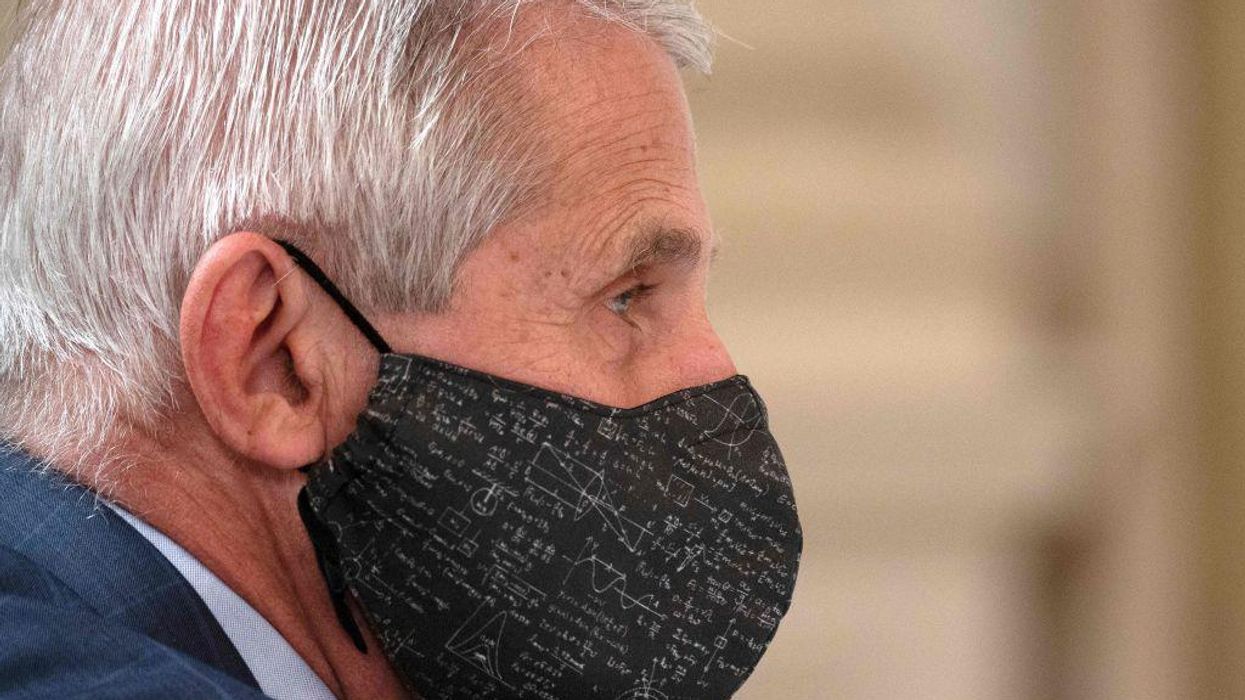
JIM WATSON/AFP via Getty Images

The U.S. agency led by White House COVID adviser Dr. Anthony Fauci funded research experiments to infect humanized mice with novel coronaviruses at a laboratory in Wuhan, China, newly released documents reveal.
Over 900 pages of documents were obtained by The Intercept as part of a Freedom of Information Act request against the National Institutes of Health. The documents detail how EcoHealth Alliance, a U.S.-based nonprofit group that supports field research on coronaviruses around the world, awarded federal funding to study bat coronaviruses at the Wuhan Institute of Virology.
Newly revealed details include two previously unpublished grant proposals that were funded by Fauci's National Institute of Allergy and Infectious Diseases. One of those grants appears to show gain-of-function research — experiments that intentionally make viruses more transmissible among mammals, and particularly among humans — being funded by U.S. taxpayers through NIAID's grant to EcoHealth Alliance and a subsequent sub-award to the Wuhan University Center for Animal Experiment. The grant was awarded for a five-year period between 2014 and 2019.
From The Intercept:
One of the grants, titled " Understanding the Risk of Bat Coronavirus Emergence," outlines an ambitious effort led by EcoHealth Alliance president Peter Daszak to screen thousands of bat samples for novel coronaviruses. The research also involved screening people who work with live animals. The documents contain several critical details about the research in Wuhan, including the fact that key experimental work with humanized mice was conducted at a biosafety level 3 lab at Wuhan University Center for Animal Experiment — and not at the Wuhan Institute of Virology, as was previously assumed. The documents raise additional questions about the theory that the pandemic may have begun in a lab accident, an idea that Daszak has aggressively dismissed.
The bat coronavirus grant provided the EcoHealth Alliance with a total of $3.1 million, including $599,000 that the Wuhan Institute of Virology used in part to identify and alter bat coronaviruses likely to infect humans. Even before the pandemic, many scientists were concerned about the potential dangers associated with such experiments. The grant proposal acknowledges some of those dangers: "Fieldwork involves the highest risk of exposure to SARS or other CoVs, while working in caves with high bat density overhead and the potential for fecal dust to be inhaled."
Dr. Richard Ebright, a molecular biologist at Rutgers University, reviewed the documents and determined that the research described fits the definition of gain-of-function experiments.
"The viruses they constructed were tested for their ability to infect mice that were engineered to display human type receptors on their cell," Ebright told The Intercept. He indicated that the documents show the Chinese researchers were able to infect humanized mice with two different types of novel coronaviruses.
In a Twitter thread, Ebright elaborated that the materials "show that the 2014 and 2019 NIH grants to EcoHealth with subcontracts to WIV funded gain-of-function research as defined in federal policies in effect in 2014-2017 and potential pandemic pathogen enhancement as defined in federal policies in effect in 2017-present."
He also said the documents confirm that one of the experiments produced several " laboratory-generated SARS-related coronaviruses," and that one of these engineered viruses "was more pathogenic to humanized mice than the starting virus from which it was constructed."
...and thus not only was reasonably anticipated to exhibit enhanced pathogenicity, but, indeed, was *demonstrated* to exhibit enhanced pathogenicity.— Richard H. Ebright (@Richard H. Ebright) 1630978394
"The documents make it clear that assertions by the NIH Director, Francis Collins, and the NIAID Director, Anthony Fauci, that the NIH did not support gain-of-function research or potential pandemic pathogen enhancement at WIV are untruthful," Ebright said.
The documents make it clear that assertions by the NIH Director, Francis Collins, and the NIAID Director, Anthony Fauci, that the NIH did not support gain-of-function research or potential pandemic pathogen enhancement at WIV are untruthful.— Richard H. Ebright (@Richard H. Ebright) 1630978394
Fauci, the director of NIAID, has repeatedly denied that his agency or any part of the National Institutes of Health provided federal funding for gain-of-function research at the Wuhan Institute of Virology. In July, Fauci accused Sen. Rand Paul (R-Ky.) of lying after Paul pressed him on NIAID's funding for coronavirus research in Wuhan.
The Wuhan Institute of Virology lab has been the focus of efforts to discover the origins of the COVID-19 pandemic. While many scientists maintain that the most likely origin for the SARS-CoV-2 virus is natural spillover — a bat coronavirus, for example, making the evolutionary leap to infect humans — others have raised questions about the possible role the Wuhan lab played in the virus' origins, given its proximity to the first outbreak of COVID-19 in Wuhan and the research that was conducted there.
The most relevant question is whether Chinese scientists in Wuhan performed gain-of-function experiments to engineer coronaviruses, and whether its possible one of those viruses escaped and caused the COVID-19 pandemic.
Scientists have so far been unable to conclusively prove that SARS-CoV-2 had a natural origin, which has led many in the scientific community to call for intense scrutiny of the Wuhan lab as part of any investigation of the origins of the pandemic. President Joe Biden in May ordered the intelligence community to investigate the matter, and the classified August 27 report he received was inconclusive.
But the new documents obtained by The Intercept support accusations that scientists in Wuhan, at the Wuhan University Center for Animal Experiment if not the Wuhan Institute of Virology, were performing the kinds of dangerous experiments that many had previously warned could cause a pandemic under unsafe conditions.
And according to Sen. Paul, the documents show that "Fauci lied."
Surprise surprise - Fauci lied again\n\nAnd I was right about his agency funding novel Coronavirus research at Wuhan. \n\nRead this thread and the papers released.https://twitter.com/r_h_ebright/status/1435053505169944579\u00a0\u2026— Senator Rand Paul (@Senator Rand Paul) 1631013000